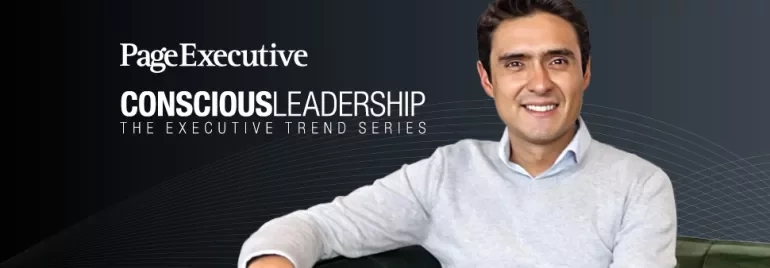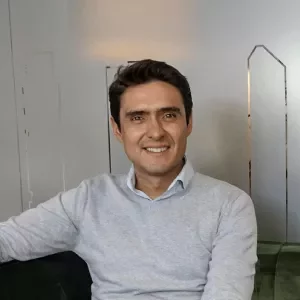Looking to hire your next leader?
Get in touch with one of our consultants now to discuss your leadership talent requirements.


![]()
If I said the word “CEO” to you right now, your mind would likely go straight to the image of a company’s top boss. But what if I told you there’s a new kind of CEO in town?
The lesser known, but increasingly vital role of “Chief Efficiency Officer” is on the rise in certain markets across the globe, with Europe, Asia and the US leading the way in recognising its potential – in fact, New York City has recently hired its first ever. But what is it, and do businesses really need another CEO?
The answer is a resounding yes, and I’m going to tell you why. But first, let me share a little context...
I find myself in quite a unique and fortunate position to have had a very varied background in my early career. Starting out in journalism and communications, I then moved into the world of tech – building a mobile app and launching a Financial Services startup, which provided banking solutions for people without a bank account. I then went on to set up an ecommerce start up with a couple of friends, which was successfully sold a few years later.
These diverse roles have given me a given me a great understanding into how technology and innovation really can change lives, and have undoubtedly helped me in my role as an executive search partner – as I’ve been able to draw upon my own experience when advising clients on the critical skills they need in their business.
Around two years ago, I began working with a French insurance company who were undergoing a digital transformation. In a meeting with the Chief Executive Officer, he described his frustration at the lack of relationship between the technology and operations parts of the business. His question was: how do we facilitate better communication between the two sides and what talent do we need to make that happen?
His question sparked a memory – wasn’t it only recently that I had been reading about this particular challenge? I cast my mind back to an article I’d seen a few months ago in a leading business publication around the rise of a new role: the Chief Efficiency Officer.
The article echoed my client’s sentiment in that, often, businesses work in silos when it comes to technology and operations. And, according to McKinsey: "The narrow, parochial mentality of workers who hesitate to share information or collaborate across functions and departments can be corrosive to organizational culture."
But CTOs and COOs will have their own direction, and their own goals and targets to hit. So, who is responsible for driving real efficiency by moving the business towards one shared goal?
The person taking on a challenge like this needs to have a broad mixture of technical and strategic ability. On the one hand, you need them to have a good understanding of emerging technologies like AI, big data and Blockchain. On the other, you need someone who runs with the business, understands the product and proposition, and where in the market they need to play and how to win.
They will be responsible for driving a culture of innovation, overseeing the automation of processes and communicating the benefits to stakeholders – bringing the rest of the c-suite, colleagues across the wider business and, of course, customers, along on the journey.
Accenture’s latest ‘Pulse of Change Index’ found that the rate of change for businesses has risen 183% over the past four years, and 33% in the past year alone. With technology changing quicker than we can keep up, and the economic landscape shifting on an almost daily basis, change management influencing are critical soft skills needed to complement the technical ones. Convincing people that change is good is a tough job – many leaders can be stuck in legacy ways of operating – so this person has to be comfortable leading the charge when it comes to stepping into new territory.
I get asked this question a lot when I talk with colleagues and peers in the headhunting industry and beyond. It’s a good question – but the truth is that ultimately, it’s relatively industry agnostic – this role could be a game changer for any sector. In my role here at Page Executive, I’m focused on the services that move the economy of the country, for example, financial services, the services sector, logistics and supply chain, and retail and consumer goods. These are the industries that we’ve identified as having the most to gain from this type of role straight away, but I predict other industries will follow suit as soon as the positive outcomes become evident.
Having spoken to numerous clients who feel there are links missing in the chain between different areas of their business, I’ve been able to drill down into some of the key focus areas someone stepping into this role could expect to be tasked with.
First and foremost, the person needs to get down and deep into the field where things happen. As an example, a “CEO” in the consumer goods industry shouldn’t be spending 100% of their time in the office behind a desk. As reiterated by this McKinsey study, they should be going from store to store, talking to the supermarket manager to understand what’s selling well and what’s not, finding out how much product they need in store for the next week etc. Ultimately, they need to know what’s happening “on the street”.
Secondly, they need to be ahead of the game when it comes to emerging technologies – so embedding themselves into this side of the business, talking to the technical employees, testing new products and software, and meeting suppliers is key. This person might not have a personal background in technology, but a keen understanding, awareness of the state of play and ability to manage people with these types of skills will be critical.
I’m currently reading a great book called The Emerging Strategy by Alejandro Salazar Yusti, which talks about why companies need to reevaluate their annual strategic planning processes. Every year, a business starts with a big bang and a brand-new strategy – you can bet that they’ve been offsite for three days coming up with the perfect plan. But the problem we always face (never more so than in this post-Covid, economically turbulent landscape) is that the market inevitably changes mid-way through. In the end, the strategy clashes with the market.
It’s the role of this person to be ahead of the game, updating the strategy plan constantly as they go along, communicating back to the rest of the leadership team and making sharp decisions that refocus the business according to changing external factors. They need to have the confidence to change direction and make decisions really fast. As we say in Colombia: "You’ve got to build the plane while you fly."
A few months ago, I was working for a multinational consultancy firm to hire a candidate into a Lead Data Scientist role. Her background was heading up data science teams, and she would be responsible for coming in to the company, leading a team of 50+ data scientists whilst also playing a big role in leading the growth and strategy planning.
Natalia Ochoa offers a brilliant example of how to nail the wide-ranging responsibilities of this role and has been doing so successfully for over almost 3 years. Here, she kindly shares an insight into her experience with us.
Companies, markets, and economies are facing increasing challenges. Alongside new technology offerings, AI applications like ChatGPT have taken center stage, pushing us to become leaders in leveraging these tools and rethinking our work dynamics. This surge has underscored the need to thoroughly understand, utilize, and govern these innovations within our organisation.
A Chief Efficiency Officer must stay ahead, critically evaluate every emerging tool, and thoughtfully integrate it into processes while allowing flexibility for change. My guiding principles for leading and driving efficiency: Be proactive, shape the future, and get hands-on. Don’t just trust—prove. Don’t just embellish—make it work. Don’t overthink—learn as you go. Above all, be more human: listen actively, learn broadly, empower others, and create space for new ideas. Effective communication is crucial, yet it remains one of the most challenging skills to master in any organisation.

Natalia Ochoa
Analytics Lead, Global Consultancy
Conscious leaders reading this may relate to the challenges of siloed teams and lack of internal communication. But ultimately, diving into the unknown is a risk, isn’t it?
It’s true that the “new CEO” is an emerging role and not one that we have hundreds of historic examples to benchmark against. But, whilst 57% of CIOs say they play a role in actively defining corporate strategy (according to PwC), it’s clear that there is still room for the technology side of the business to get closer to its operational counterpart, in order to drive real efficiency. The CTOs and COOs that embrace this necessary change and diversify their skills will not only be setting themselves up for greater success right now, but also futureproofing themselves as the multi-faceted Chief Efficiency Officer role becomes more prevalent, as businesses realise how beneficial it could be.
One thing that I am continuously humbled by is the trust placed in us to find the perfect fit for some of the world’s most forward-thinking, smart and successful businesses. However – it’s often the case that companies already have the potential within their own teams, and with a little bit of training and upskilling, perhaps that person is already your star COO or CTO. Whatever the case, it’s my job to help my clients make the right decision and, through deep conversations, find those paradigms that will lead them to discover new paths in their business. So, if you are reading this and would like to have an exploratory conversation, I’d love to help you determine the best path forward. Get in touch with me now.
Get in touch with one of our consultants now to discuss your leadership talent requirements.

Choose your country from the list below to complete the brief form:


